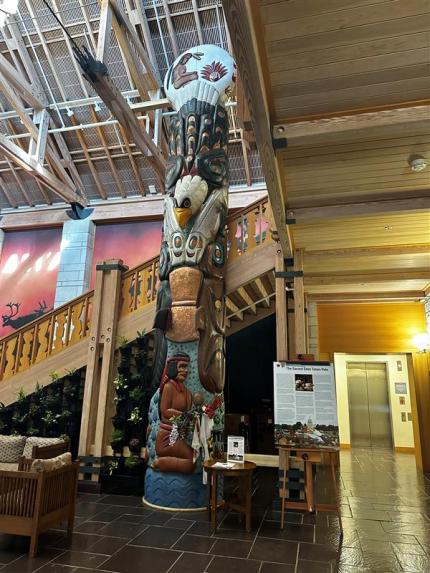
The America the Beautiful Challenge (ATBC) is a public-private grant program that funds conservation projects across the nation. Intended to streamline grant funding opportunities for new voluntary conservation and restoration projects around the United States, ATBC consolidates funding from multiple federal agencies and the private sector to enable applicants to conceive and develop large-scale projects that address shared funder priorities and span public and private lands.
The 2023 grant slate (PDF) included $1 million for the Washington Department of Fish and Wildlife (WDFW) to collaborate with Washington’s 29 federally recognized Tribes and two Tribes with off-reservation treaty rights to develop an adaptive framework to manage outdoor recreation impacts on ecosystems, tribal treaty rights and other tribal lifeways across state public lands. The project will support convening of a Tribal-State recreation forum and inform future management of recreation to be more ecologically sustainable and protect the long-term health, conservation, and cultural resources of these lands.
The 2024 application period was open from April 5-29.
For questions about the program, contact Nicole.Kates@dfw.wa.gov.
Background
Recreation on Washington State-managed lands must be planned and managed to maintain ecological integrity for the benefit of future generation of tribal and non-tribal peoples, fish and wildlife. The Governor’s Office of Indian Affairs, WDFW, the Washington Department of Natural Resources (DNR), and the Washington State Parks Commission are collaborating with obligations to Washington tribes.
The vision of this effort is for the tribes and state agencies to work together to co-develop recreation management tools and an adaptive management framework that effectively coordinates cooperative stewardship of natural and cultural resources and preserves protected tribal rights on state lands.
The cooperative process uses a tiered structure to plan and direct the overall effort, coordinate work tasks, develop recommendations, make decisions, report progress, and otherwise manage the flow of information. The three tiers include Leadership, Steering Committee and three functional workgroups.
This is an intensive effort that relies on collaboration from all 29 federally recognized tribes in Washington State as well as the Nez Perce and Umatilla who have terrestrial tribal rights in Washington State. These subgrants are intended to provide direct capacity support to these tribal governments to offset some of the cost of their participation in this work.
Reimbursement form
In addition to funding a Recreation Ecologist to directly represent tribes in the development of the framework and associated tools, the grant provides direct subgrants to tribes for participation in the collaborative effort. The overall award amount to each tribe will be based on how many tribes submitted an application by the deadline. The available funds will be distributed evenly amongst the number of all eligible tribes. The distribution will be implemented via reimbursements. Reimbursable activities are associated with travel to attend, time to attend, time to prepare for, and eligible indirect rates associated with the participation in the Leadership, Steering Committee and functional workgroup meetings.